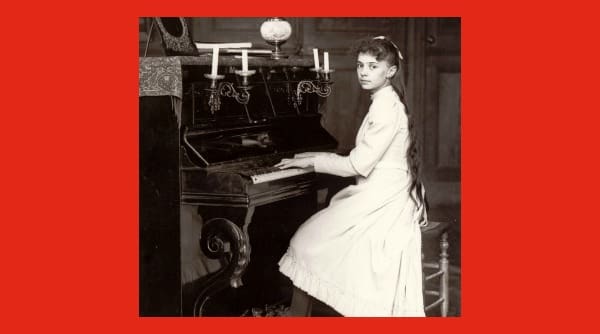This Present Paradise
A Series of Reflections on St. Elizabeth of the Trinity
(Read part 6 here)
From the time I was a little girl, I loved to write. Nothing held as much promise as a smooth, new notebook, wide open and waiting for words.
Stories and poems, thoughts and prayers, all pressed with love and ink on thousands of papers and stacks of notebooks. I lost myself in words. And often, found God waiting within them. Writing was for me an effortless, pure form of prayer. It still is. And when, by the grace of God, it touches other people, sweeping them up into a shared experience of faith or hope or love, writing becomes a particular kind of gift.
That is the beauty of a charism: a gift of the Holy Spirit, given to the individual but meant for the Church, a grace to be given away. When we were baptized, we were given all the gifts necessary for our own personal sanctification. But we were also, without exception, given gifts intended for others, to be channels of God’s power in the Church and the world.
St. Elizabeth of the Trinity had an exquisite gift of music. For her, it was a holy experience to play the piano. It was a type of prayer. Others recognized her gift from the time she began playing as a child—she received awards and rave reviews, and many expected her to have a career in music. But even more, those attuned to the spiritual life recognized something divine happening when her hands ran over the keys.
When we serve God and his people out of our giftedness, it feels fluid and free. Sometimes astonishingly fruitful things happen. The secret is that it is because it is the Holy Spirit acting, masterfully moving in and through us to the degree we allow Him. So when a saint with a charism plays music, her hands flying over the keys and her heart sending a song heavenward, listeners follow her straight to paradise. Her music is a pure praise of God and puts people in His presence. The reason? The saint knows, that in the exercise of this gift, as with all charisms, she has become the instrument. When she was once complimented on her playing, she replied simply and humbly: “It was not I who played. He played for me.”
God desires that we all know the experience of being a channel of grace – of using a gift for His kingdom, to feel the freedom and joy it brings. To find ourselves operating in union with Him on a level above any ordinary human talent, elevating our experience to something beyond ourselves.
The gift itself may be humble and hidden: intercession, artistry, hospitality, service in the small things— arranging flowers for the altar, gathering people around a warm and welcoming table, interceding in a particularly powerful way before the tabernacle. Or our gift may be used on a wider and more visible platform: evangelization, teaching, leading. But the results are the same. God is made manifest, hearts are renewed, and His people, drawn by a divine hunger, are moved to worship Him.
And we, the ones cooperating with the Spirit as we use our gifts, are no less blessed.
Marian T. Murphy writes in Elizabeth of the Trinity: Her Life and Spirituality that “Elizabeth entered so completely into her playing that she lost herself in it, becoming one with it. In the same way, she immersed herself in prayer, losing herself in God. For Elizabeth, music was not just an extension of prayer, it was prayer: love seeking expression. She confided to a friend, ‘When I can no longer pray, I play!’ and ‘Oh, how I used to love speaking to Him that way!’”
Used to. Because when she entered the Carmel, her old life, including her music, had to stay on the other side of the threshold. It was a sacrifice to let that precious part of her go, to add another little death to this new kind of life in Jesus Christ, austere and silent. This sacrifice, like all sacrifices, is never wasted. A different kind of fruit comes from setting something aside for a greater vocation. How many mothers have, even if just for a few years, had to let go of plans and promising opportunities to stay home with little souls? God is glorified in our willingness to lay down even His own gifts at His feet.
So your talents, your personality, your qualities are being wasted. So you’re not allowed to take full advantage of them. Meditate well on these words of a spiritual writer: The incense offered to God is not wasted. Our Lord is more honored by the immolation of your talents than by their vain use. -St. Josemaría Escrivá, The Way.
She had spent hours each day with music. But the hours of prayer now became a new kind of melody, lyrically poured out in her writings from the convent as she learned to live out of a new intensity of love and suffering. “We will also climb our calvary singing in the depths of our hearts and raising a hymn of thanksgiving to the Father,” she wrote in her retreat Heaven in Faith.
And besides this, we know well that God will never take anything away without giving a new gift. This time, it was one of God’s beautiful reversals. Now He began playing in her soul. She herself would become the song – a living praise to His Glory. This would be the fulfillment of the gift, resurrected in a new and beautiful way. She would fall silent, and a new sound would rise.
A praise of glory is a soul of silence that remains like a lyre under the mysterious touch of the Holy Spirit so that He may draw from it divine harmonies, it knows that suffering is a string that produces still more beautiful sounds; so it loves to see this string on an instrument that it may more delightfully move the heart of its God.
(Read part 8 here.)
Image credit:Willuconquer [CC BY-SA 3.0], via Wikimedia Commons




